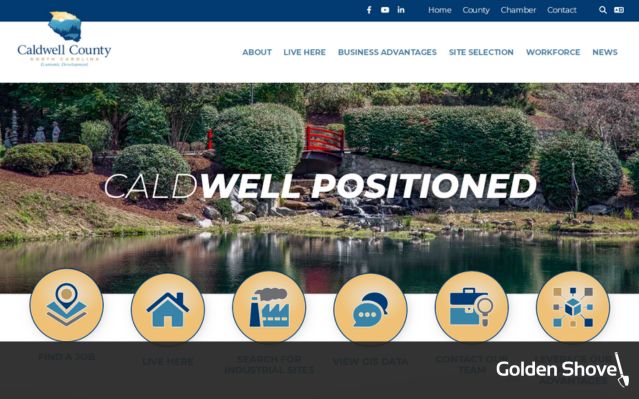Diving Deeper: Developing a Keyword Strategy & Building Backlinks to Support SEO Efforts

12 Jun 2023
News, Marketing
With so much online competition, economic development organizations need a strong SEO presence to stand out and attract the right audience. Two critical aspects of successful SEO efforts include developing a keyword strategy and building high-quality backlinks.
Developing a Keyword Strategy for SEO
A keyword strategy involves identifying the specific words or phrases people use when searching for information about your community or economic development initiatives. Optimizing your website and content with these keywords can increase your chances of ranking higher in search engine results pages (SERPs) and attract more targeted traffic. Here are some specific strategies for developing a keyword strategy for SEO:
#1 Conduct Keyword Research & Brainstorm
The first step in creating a keyword strategy is researching the most relevant and valuable keywords for your community. Start by brainstorming potential keywords and phrases your target audience may use when searching. Then, use keyword research tools like Google Keyword Planner or SEMrush to identify related keywords and their search volume.
#2 Analyze Your Competition
Analyzing your competition can provide valuable insights into their keyword strategy and potential gaps in your own. Use tools like SEMrush or Ahrefs to analyze your competitors’ websites and identify the keywords they are ranking for. You can also identify keywords your competitors aren’t targeting, which can present an opportunity for you to rank higher. Determine how difficult it would be to rank for each of your desired keywords based on the competition and the strength of your website.
#3 Prioritize Keywords
Prioritize the keywords on your list based on their relevance, search volume, and competition. Focus on high-priority keywords relevant to your organization and have a reasonable chance of ranking well. Select five or fewer keywords to start with. Organizations that prioritize few keywords and create a lot of content to support them will be more successful than those who focus on a long list of keywords with very little content and few links.
Long-Tail Keywords
When conducting keyword research, it’s important to consider the use of long-tail keywords. These are longer, more specific phrases that are less frequently searched but often have higher intent and can lead to higher conversion rates. For example, instead of targeting a broad keyword like “industrial sites,” you might target a long-tail keyword like “available industrial sites in the midwest.” While the search volume for this specific keyword may be lower, the intent behind the search is much more specific, indicating a higher likelihood of conversion. Additionally, long-tail keywords are typically less competitive, meaning it may be easier to rank for them and drive traffic to your website.
#4 Optimize Your Website and Content
Once you’ve identified your target keywords, optimizing your website and content to include them is essential. This includes optimizing your meta tags, headlines, and content with your target keywords while ensuring your content remains high-quality and relevant to your target audience. Avoid “keyword stuffing” or excessively using your target keywords, as this can harm your SEO efforts. Instead, use variations of your keywords and ensure that your content is informative to the target audience.
#5 Incorporate Keywords Into Website Images
Save website images with important keywords and include those keywords in alt descriptions. This will enable the image, and website, to show up in a Google image search.
Building Backlinks for SEO
Backlinks, or links from other websites that point to your site, are also a crucial component of SEO. They signal to search engines that other websites view your content as valuable and relevant, which can increase your website’s authority and search engine rankings. However, not all backlinks are created equal. High-quality, relevant backlinks from authoritative websites will significantly impact your SEO efforts more than low-quality, irrelevant backlinks. Here are some specific strategies for building high-quality backlinks:
#1 Create High-Quality Content
Creating high-quality content that provides value to your target audience and community stakeholders can naturally attract backlinks from other websites. When creating content, focus on providing unique insights, data, or perspectives that aren’t readily available elsewhere. Consider using visual content like infographics, which can be more shareable and linkable than traditional written content.
#2 Guest Blogging
Guest blogging involves writing and publishing content on another website that links to your site. This strategy can provide valuable exposure to a new audience while building high-quality backlinks. However, it’s essential to focus on guest blogging opportunities relevant to your niche and target audience. In addition, guest blogging can also build relationships with other website owners and influencers.
#3 Outreach
Outreach involves contacting other websites and industry influencers in your niche and requesting they link to your site. This can be done through email outreach, social media, or leveraging existing relationships with other website owners. When reaching out, focus on providing value and emphasizing how your content or website can benefit their audience. Again, this will help you to build meaningful relationships with these individuals.
#4 Participate in Industry Events and Conferences
By speaking at events and conferences related to economic development, you can gain exposure for your website and earn backlinks from event websites or media coverage. We also recommend applying for awards, such as the annual International Economic Development Council (IEDC) Excellence in Economic Development Awards. Winning an IEDC Award will garner much attention to your economic development organization.
#5 Create a Resource Page
Creating a resource page on your website that lists helpful links, tools, and resources related to your community and economic development can attract backlinks and citations from others looking to share valuable resources with their audience. Golden Shovel Agency provides an excellent example of this in our “Resource Learning Center,” which houses our podcast episodes, webinars and events, and all available eBooks and whitepapers for economic developers to download, free of charge.
#6 Create an FAQ Page
Answer frequently asked questions in a Q&A format, adding keywords to both. Many people type questions into a search browser, creating opportunities to answer them while furthering on-page SEO.
More Topics


Royse City ISD Continues to Provide Educational Abundance Through Local, Affordable Initiatives
Jun 7 2023


